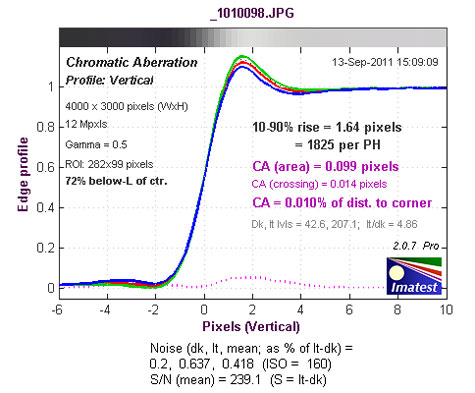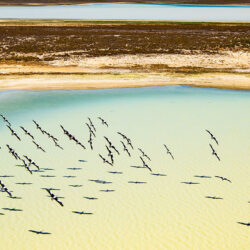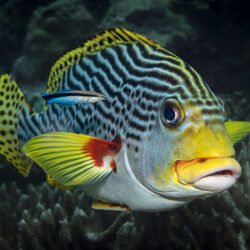Panasonic Lumix G 14mm f/2.5 ASPH Lens (H-H014E)

In summary
A fast, lightweight ‘pancake’ prime lens for Micro Four Thirds System cameras.Panasonic’s Lumix G 14mm f/2.5 ASPH lens was released roughly a year ago with the GF2 camera body. A fast and compact, ‘pancake-styled’ prime lens, it is also offered with the new GF3 camera and bundled in the single-lens kit, which has an RRP of $899, where it represents great value for money. If you buy this lens on its own, however, the RRP is $649, which will probably deter potential buyers. . . [more]
Full review

Panasonic’s Lumix G 14mm f/2.5 ASPH lens was released roughly a year ago with the GF2 camera body. A fast and compact, ‘pancake-styled’ prime lens, it is also offered with the new GF3 camera and bundled in the single-lens kit, which has an RRP of $899, where it represents great value for money. If you buy this lens on its own, however, the RRP is $649, which will probably deter potential buyers.
This is the second ‘pancake’ lens Panasonic has produced for its G-Micro camera bodies. The first was a 20mm f/1.7 lens, which arrived with the GF1 and was reviewed in September 2009. As with the 20mm lens, this lens comes with front and end caps but no lens hood.
Not only is the 14mm lens smaller and lighter than the 20mm f/1.7 lens, but the new GF3 body is also more petite than previous models. And this makes the camera+lens combination pocketable and, therefore, attractive to photographers looking for a ‘walkaround’ combo that delivers high image quality at reasonably high sensitivity settings.

Angled view of the Lumix G 14mm f/2.5 ASPH lens showing the front element. (Source: Panasonic.)

Side view of the lens showing its shallow depth. (Source: Panasonic.)
The 14mm focal length covers an angle of view of 75 degrees, which is equivalent to using a 28mm lens on a 35mm camera. It’s classed as moderately wide and best suited to landscape photography and group portraiture. The closest focus is 18 cm, which is inadequate for shooting close-ups of small objects but usable for larger flowers and animals.
Build and Ergonomics
Build quality is similar to the 20mm lens. It appears to be made mainly from black polycarbonate and is manufactured in Japan. It has a metal mounting plate, which surrounds a black plastic ring carrying 11 gold contacts. The rear element sits at the centre of this ring, recessed by a millimetre or two.
The outer barrel is a matte black plastic strip roughly 15 mm wide. It carries a 9 mm wide ribbed focusing ring. The front of the lens is threaded to accept 46 mm diameter filters. The front element of the lens doesn’t move during focusing, allowing use of polarisers and graduated filters.
The optical design consists of six elements arranged in five groups and includes three aspherical elements. There are seven blades in the iris diaphragm and they close to a circular aperture. Aperture settings range from f/2.5 to f/22.

The diagram above shows the position of the aspherical elements in this lens. (Source: Panasonic.)
This being a prime lens it has only one adjustment ring, which controls manual focusing. It’s approximately 5 mm wide and made from ribbed plastic and is located 3 mm behind the front of the lens. As focusing is ‘by wire’ this ring can be rotated indefinitely in either direction and moves smoothly and positively. There are no stops to mark the infinity or close-focusing distances.
The only other feature on the lens barrel is a raised red index dot which is lined up against a recessed red dot on the mounting plate. The lens clicks in firmly and is well-balanced on the GF3 body (and also on the Olympus E-PL3, which we had at the same time).
The autofocus drive uses a stepping motor with a screw unit in the motor shaft that moves the focus lens directly, without relay gears or cams. Information transfers from lens to camera faster, making auto focus swift and accurate as well as very quiet, producing little or no interference in movie soundtracks.
Performance
Our Imatest testing showed this lens to be a competent performer on the GF3 body, particularly with raw files (the results of which can be seen in our review of the GF3). Out-of-the-camera JPEGs produced lower resolution but were good enough to show the strengths and weaknesses of the lens.
Imatest showed this lens provided the highest resolution between f/2.5 and f/5.6 with a gradual tailing off towards f/22 as diffraction progressively affected image quality. Interestingly, when the GF3 was used in any of the auto exposure modes (iA, P or the Scene pre-sets), the camera favoured aperture settings within this range and would only stop down when it ran out of ISO room.
Slight edge softening was seen at all aperture settings, although it was never obvious enough to affect normal photography and became effectively negligible by f/4.5. Diffraction kicked in to reduce performance around the f/10 point. The graph below shows the results of our Imatest testing.

Lateral chromatic aberration was extremely low across all aperture settings and no coloured fringing was apparent in test shots. In the graph below, showing the results of our Imatest testing, the red line marks the border between ‘negligible’ and ‘low’ CA.

Autofocusing was very fast, as expected from a contrast-based system with a fast lens, and accuracy was very high. Small changes in focus were extremely fast. The wide aperture also provided a bright enough image to support manual focusing after dark.
Although it was possible to force the review lens to flare by pointing it at a bright light source, normal backlighting was generally handled well, thanks to effective multi-coatings. Fitting a lens hood would make the lens more flare-resistant.
Vignetting was just noticeable at f/2.5 but almost gone by f/3.2. Barrel distortion was evident but would not affect normal photography.
The M4/3 format makes it difficult to obtain really soft out-of-focus areas in shots, even with the f/2.5 aperture setting. Consequently, bokeh wasn’t one of the lens’s strong points. The minimum focusing distance of 18 cm meant a lot of background was included in close-ups, further limiting opportunities to shoot with smooth bokeh.
However, the small size of this lens and its ergonomic compatibility with the GF3 body enabled us to shoot hand-held with shutter speeds as slow as 1/2 second without requiring stabilisation (which isn’t provided in this lens).
Buy this lens if:
– You want a fast, slim and light lens for everyday photography.
– You require high performance across a wide aperture range.
Don’t buy this lens if:
– You really need a zoom lens.
– You shoot lots of close-ups.
IMATEST GRAPHS
(based on JPEG files recorded with the GF3 body)



SAMPLE IMAGES

Vignetting at f/2.5.

Vignetting at f/2.8.

Vignetting at f/3.2.

Rectilinear distortion.

Close-up; 1/800 second at f/2.5; ISO 160. Note the rather choppy rendition of the background.

Backlit subject; 1/1600 second at f/3.5; ISO 160.

Flare; 1/500 second at f/8; ISO 160.

Stability test for GF3 camera plus lens;1/2 second at f/5; ISO 160.

1/640 second at f/2.8; ISO 160.

Widescreen (16:9) format; 1/2000 second at f/3.5; ISO 160.

1/250 second at f/2.5; ISO 160.
Additional image samples can be found with the review of the Panasonic Lumix DMC-GF3.
Specifications

Picture angle: 75 degrees
Minimum aperture: f/22
Lens construction: 6 elements in 5 groups (3 aspherical lenses)
Lens mounts: Micro Four Thirds
Diaphragm Blades: 7 diaphragm blades (Circular aperture diaphragm)
Focus drive: MSC screw drive
Stabilisation: No
Minimum focus: 18 cm
Maximum magnification: 0.10x
Filter size: 46 mm
Dimensions (Diameter x L): 55.5 x 20.5 mm
Weight: Approx. 55 grams
Retailers
CamBuy
www.cambuy.com.au
Digital cameras, lenses and accessories with 100% genuine Australian manufacturer’s warranties.
Ph: (02) 9029 2219
Camera House
www.camerahouse.com.au
Ph: 133 686
The largest speciality photographic retail chain in Australia.
Camera Pro
www.camerapro.net.au
CameraPro Pty Ltd
Suite 607, 180 Queen St, Brisbane 4000
Tel: 07 3333 2900
Australian owned and run company based in Brisbane.
Camerasdirect
www.camerasdirect.com.au
Retailer of digital camera equipment and more.
Secure online shopping and delivery across Australia.
Ph: 1300 727 056
Camerastore.com.au
Camerastore.com.au
Ph: 1800 155 067
Camera-Warehouse
www.camera-warehouse.com.au
Comprehensive range of digital cameras and accessories online (www.camera-warehouse.com.au) and an online print service (www.royalexpress.com.au).
Digital Camera Warehouse
www.digitalcamerawarehouse.com.au
174 Canterbury Road 367 High Street
Canterbury Northcote
NSW 2193 VIC 3070
Ph: 1300 365 220
Electronics Warehouse
www.electronicswarehouse.com.au
1300 801 885
Australian retailer of Vapex rechargeable batteries offering factory direct prices and fast, free shipping Australia wide.
Photographic Equipment & Supplies – Retail & Repairs. Click here for list of stores.
Ted’s Cameras
1800 186 895
Big range of cameras and photographic products with stores in most states and online.
Rating
RRP: $649
Rating (out of 10):
- Build: 8.5
- Handling: 8.8
- Image quality: 8.8
- Versatility: 8.5
- OVERALL: 8.0 (if purchased alone)













